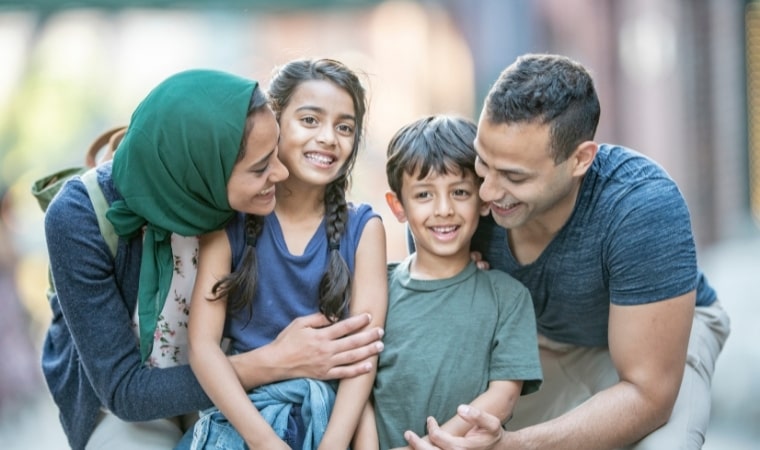Let’s talk about sex education for Islamic families, as parents do ask about it in my free Facebook sex education group for parents, that parent group.
Some excerpts from the book “How to talk to your Muslim child about sex” can be found in this blogpost.
Sex education is challenging for Muslim parents
Parenting in the age of social media has presented parents with a whole new set of challenges, most notably the decline of moral values and a rise in the sexualization of society.
Yet, conversations around sex and relationships are absent in too many Muslim homes. There are many reasons Muslim parents are reluctant to discuss sex and sexuality with their children. There is the fear that it awakens curiosity which leads to sexual activity and the adoption of the values of the dominant culture.
Parents don’t know what to say, how to say it, or when to say it because they likely grew up in homes where these conversations were non-existent or awkward because it didn’t fit with our tradition of modesty and privacy. There is also the worry that children are ‘too young’ for this conversation, yet they are being brought into the adult world at younger ages and need guidance to navigate these years. Lastly, there is the ‘not my child’ argument where parents feel their children know right from wrong so it’s not a needed conversation.

Muslim children need these conversations
The reality is very different. Muslim youth are engaging in sexual activity. The number of never-married Muslim college students who reported having had sexual intercourse was 53.8% according to a study by the Family and Youth Institute. [1]
Pornography consumption is a growing problem in the Muslim community. 59% of immigrant-origin Muslim youth in the USA indicated that they view pornography and only 13% felt they could turn to family or community for support according to preliminary community research from Naseeha Mental Health (2018) and from Young Muslims (2020, 2021). [2]
In 2013, 100% of the calls from Canadian Muslim boys aged 11-14 years of age to the Islamic helpline, Naseeha were related to masturbation and pornography. [3]
In a 2016 interview, the founder of the online program ‘Purify Your Gaze’ which helps Muslims suffering from porn addiction, said teens start going online because of the void in discussing sex and healthy sexuality in our community. [4]
Your children are taking in sexual language and explicit imagery every day and at ever younger ages. It is in our advertisements, music and music videos, TV shows, magazines, commercials, and movies. Sex is everywhere, down the aisle at the grocery shop, the mall, the billboards, so it must be important because everybody wants to have sex. Yet it’s no big deal because you don’t have to be committed to anyone to have sex. People on TV shows and movies just hop into bed on a first date, sometimes not even remembering their date’s name in the morning! The messages are confusing. They can’t be left with no communication at home while their hormones are raging in an environment with sexual imagery, leaving them at the mercy of a different set of values.
If they aren’t getting information from you, it will be from peers and from the internet where it is easy to stumble onto pornography. Parents are still the biggest influence on their children’s values and sexual behaviour. Comprehensive sex education does not increase sexual activity rates but rather has the opposite effect of helping young people make better decisions. It is important for this education to begin with young children learning to use correct anatomical terms, understanding safe and unsafe touch, consent and boundaries to help protect against sexual abuse.

Information empowers & protects children
I completely understand how parents want to protect their children, but they are doing their children a great disservice if they are not preparing them for the hypersexualized world they live in.
Leaving our children and youth without sex education leaves them ill-equipped to deal with their burgeoning hormones and bodily changes and vulnerable to misinformation from pornography. This will leave them with an unhealthy view of relationships making them more vulnerable to engage in pre-marital sexual activity and abuse.
Talking to your children empowers and protects them and is the best way to help them reject the pornified culture that surrounds them. We need to be teaching them that sex in Islam is something sacred and loving, given as a gift in marriage.
Ultimately, we want to raise our children to be adults who can enjoy and sustain a mutually satisfying healthy relationship in marriage. If we remember this goal, then we must build those relationship skills from birth while we guide them to handle their sexuality Islamically.
Islam has a history of openness about sexuality and education around it. The Qur’an mentions menstruation, conception, ejaculation, and the sexual rights to pleasure of both men and women. Prophet Muhammad (SAW) spoke to the ummah about these matters. He did not shy away from them. We are born sexual beings. It is time to reclaim sexuality from being degraded to being celebrated as our Creator intended.
Resources for Islamic families
A sex education book for Islamic parents by Riroza osman that will help you to navigate sex education – How to Talk to Your Muslim Child About Sex.
Firoza also provides coaching to parents on dealing with conversations around sex, puberty, masturbation, dating, pornography, consent, healthy relationships with their children as well as how to set boundaries and deal with difficulties related to social media, screen time, gaming and pornography. You can learn more at ImamConnect or Faith Consulting.
You can find a list of sex education children’s books for Muslim families to help you with talking to your child.
References
[1] Ahmed, S., Abu-Ras, W., & Arfken, C. L. (2014). Prevalence of risk behaviors among U.S. Muslim college students. Journal of Muslim Mental Health, 8(1), 5–19.

